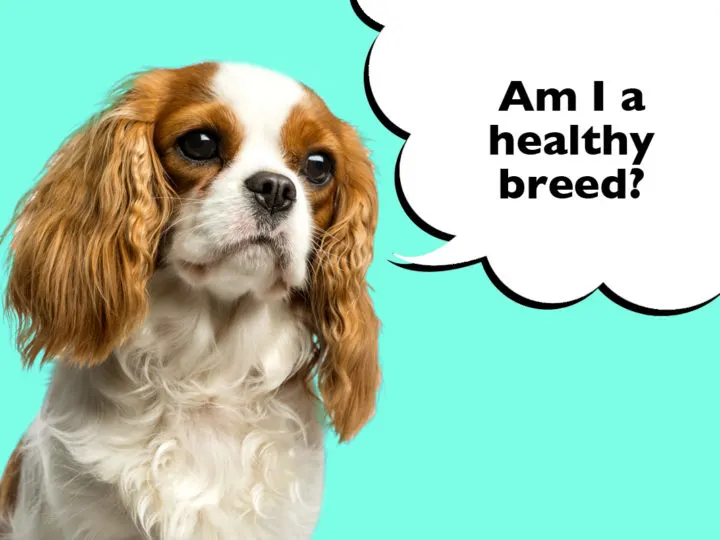Are you thinking of getting a Cavalier King Charles Spaniel and want to know what health problems they’re prone to? Maybe you want to educate yourself on the types of heath problems they could get. Here’s everything you need to know about the health problems of Cavalier King Charles Spaniels.
What Health Problems Are Cavalier King Charles Spaniels Prone To? Cavalier King Charles Spaniels are prone to joint, heart, ear and eye problems. They can also be affected by neurological conditions with 95% having Chiari-Like Malformation and almost half of those developing Syringomyelia.
Read on to find out what Chiari-Like Malformation and Syringomyelia are, more about the most common health problems Cavalier King Charles Spaniels can face, and what you can do to keep them healthy.
Never use the advice in this article as a substitute for professional veterinary advice or treatment. I am NOT a Vet, qualified dog trainer or dog behaviourist. This article is based on research, personal opinion and experience of owning dogs over the last 12+ years.
What Are The Most Common Health Issues For Cavalier King Charles Spaniels?
The most common health conditions Cavalier King Charles Spaniels have are:
Juvenile Cataracts
Cavalier King Charles Spaniels are prone to developing early-onset juvenile cataracts, as early as six months of age.
Cataracts look like a milky coloured film over the lens of the eye. Sadly, this can quickly lead to total blindness.
This condition is similar to traditional cataracts that dogs can develop as they become elderly. However, this is a genetic condition, passed on from their parents.
Fortunately, there are tests that can be carried out to see if a Cavalier is likely to pass this on to their puppies. So this is something to speak to your dog breeder about.
Cherry Eye
Cavalier King Charles Spaniels are also prone to a condition known as Cherry Eye.
This is when the third eyelid prolapses and becomes stuck across the eye.
Ordinarily, you would rarely see your Cavalier’s third eye lid, but Cherry eye makes it inflamed and red, hence the name.
This is a sore condition that usually requires surgery to fix.
Entropion or Ectropion
Entropion is when the eyelids turn inwards and make the eyelashes irritate the eye.
Ectropion is the opposite, and the eyelids turn outwards. This causes the eyes to become dry and sore.
Sadly, both conditions can lead to blindness if left untreated. And both will need surgery to correct them as they can cause a great deal of discomfort for your Cavalier.
Progressive Retinal Atrophy (PRA)
Progressive Retinal Atrophy is another inherited condition passed on from a Cavalier King Charles Spaniel’s parents.
It causes the slow deterioration of the retina in the eye, eventually resulting in total blindness.
If your Cavalier shows any signs of sight difficulties, then you should consult your vet.
There’s currently no known treatment for PRA so any dogs that are affected should not be used for breeding.

Luxating Patellas
Luxating Patellas is the official name for dislocating kneecaps. This is when your Cavalier’s kneecaps pop in and out of place, especially when they’re moving around.
You may notice them ‘skipping’ when they walk, which can signify luxating patellas.
Some severe cases may need surgery to correct and others can be supported with hydrotherapy and painkillers if required.
Unfortunately, over 20% of Cavalier King Charles Spaniels have luxating patellas.
Hip Dysplasia
Hip dysplasia is a hereditary condition passed on to puppies when breeding from affected Cavalier King Charles Spaniels. This causes their hips to not develop properly when they’re growing.
This can lead to them developing arthritis from an early age and make it difficult and painful for them to walk properly.
It’s thought at least 15.5% of all Cavalier King Charles Spaniels suffer from hip dysplasia.
Mitral valve disease (MVD)
Mitral valve disease (MVD) is a hereditary condition that causes the slow deterioration of the heart’s mitral valve.
This allows blood to flow backwards away from the heart which puts pressure on the rest of the circulatory system.
MVD is considered the leading cause of death in Cavalier King Charles Spaniels.
Research shows that Cavalier King Charles Spaniels are 20 times more likely to develop Mitral Valve Disease than other dog breeds.
They also tend to develop it at a much younger age than other breeds, making it more life-limiting for them.
Chiari-Like Malformation (CM)
It’s thought that over 95% of Cavalier King Charles Spaniels have Chiari-Like Malformation.
This is because their unusually shaped skull can create issues for them. Essentially, there’s not enough space inside their skull for their brain.
Some Cavaliers have no symptoms and can live happily without any issues from CM.
However, almost half of those with CM develop Syringomyelia in later life.
Syringomyelia
Syringomyelia is when fluid-filled cysts form on a Cavalier King Charles Spaniel’s spinal cord.
As the cyst grows, it can cause more severe symptoms like reluctance to walk, pain in the neck and head, scratching or rubbing at their head and crying if they’re touched or moved.
Sadly, over 55% of Cavalier King Charles Spaniels will have Syringomyelia in their lifetime.
The severity will vary between each dog, but it’s known to get worse in each generation of affected dogs. Therefore, any affected dogs shouldn’t be bred from.

Middle Ear Effusion
Another condition they can suffer from is ‘middle ear effusion’. This is sometimes known as ‘glue ear.’
This condition is seen almost solely in Cavalier King Charles Spaniels, though it’s not known exactly why. It’s caused by inflammation in the middle ear.
Your Cavalier may have pain in their head and neck, tilt their head to one side, scratch at their ears all the time and can even lose some of their hearing too.
You should visit your vet if you see any of these signs.
How Do I Keep My Cavalier King Charles Spaniel Healthy?
Although Cavalier King Charles Spaniels are prone to a whole host of different health problems, there are some things you can do to try and keep them healthy:
Take Your Cavalier King Charles Spaniel To The Vet Regularly
Taking your Cavalier King Charles Spaniel to the vet regularly can help detect any health issues earlier. This means you can treat them sooner.
You should be going to the vet at least once a year for a health check. But, of course, you can visit more often if you have any concerns.
Keep Up To Date With Your Cavalier King Charles Spaniel’s Vaccinations
Vaccinations are an important part of dog ownership and keeping up to date with them should be a priority.
You may even find your pet insurance company won’t cover your Cavalier if you fall behind with their jabs.
So check with your Vet which vaccinations your Cavalier needs and schedule the dates in your diary.
Keep Your Cavalier King Charles Spaniel Active
Make sure your Cavalier King Charles Spaniel’s getting plenty of exercise to keep them fit and healthy.
This can help their heart strong too, which is helpful if they have heart conditions.
Don’t push them too much though. Only exercise them for as long as they’re comfortable.
Purchase A Puppy From Health Tested Parents
Only ever purchase a Cavalier King Charles Spaniel puppy from a registered breeder who has done all the relevant health tests.
This can help lessen the risk of them developing hereditary conditions in later life.
Keep Your Cavalier King Charles Spaniel At A Healthy Weight
Cavalier King Charles Spaniels are greedy and love their food! This means they can quickly put on weight if you overfeed or don’t give them enough daily exercise.
Being overweight puts extra pressure on their joints, which may already be painful if they’ve got any existing joint conditions.
Feed Your Cavalier King Charles Spaniel A Good Dog Food
Feeding your Cavalier King Charles Spaniel high quality, nutritious dog food can help to provide them with everything they need to stay healthy.
Just like humans, they’ll have more energy and be in better condition if they’re eating the right food each day.
Check Over Your Cavalier King Charles Spaniel Weekly
Give your Cavalier King Charles Spaniel a health check each week. Check their eyes, ears, teeth, paws and body for anything concerning.
Knowing what’s normal for them means you can spot any potential issues sooner.
It can sometimes be easier to do this as part of a regular grooming routine.
Get Your Cavalier King Charles Spaniel Insured
Long term or chronic health conditions can be expensive to treat.
Make sure you take out a good level of pet insurance to help you with these costs.
Having pet insurance can mean you’ve got access to more expensive treatments than you could otherwise afford.
This can help better maintain your Cavalier’s health.
So there you have it! Cavalier King Charles Spaniels are prone to a range of heath problems, some of which may be genetic and outside of your control. So the best thing you can do is to focus on your Cavalier’s health, feed the best dog food you can afford, exercise them daily and check them over as part of their regular grooming schedule.
What do I do next?
Thank you for reading all the way to the end of this article, your support for my blog means everything to me! If you found this article helpful, please kindly share below. Thank you!

